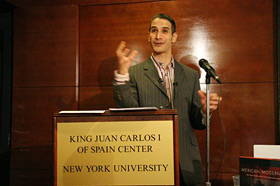 |
 |
 |
 Entertainment | Books | February 2006 Entertainment | Books | February 2006  
Author Hails Mexican Radio
 Stephanie Langan - Washington Square News Stephanie Langan - Washington Square News


| | Rubén Gallo, author of "Mexican Modernity," speaks to NYU students. (Ksenia Yachmetz/WSN) |
Mexico’s modernization began with a grassroots media explosion following the Mexican Revolution of 1910, said a Princeton University professor during a panel discussion yesterday on his new book, which traces the technological and cultural revolution of post-war Mexico.

Rubén Gallo, assistant professor of Latin American literature at Princeton University, explored the themes of his new book, “Mexican Modernity: The Avant-Garde and the Technological Revolution,” and explained the rise of radio in Mexican culture in the early 20th century. The event was held at NYU’s King Juan Carlos Center.

“Radio would allow Mexico to be projected to the top of the world,” Gallo said. “It could cross boundaries and bring Mexico out of isolation.”

The book, published in 2005 by MIT Press, addresses the media topics of “cameras, typewriters, radios, stadiums and cement.”

Gallo said Mexico’s movement into modernity was driven by “archetypal modern subjects, capitalist fantasies and a cosmopolitan desire to dissolve international boundaries through advances in technology.”

Gallo said the motivation for the media revolution was rooted in the desire to transcend boundaries in the wake of the Mexican Civil War. People hope avant-garde technology would distribute information and dissolve resentment toward Mexico, he said.

“In Mexico, radio became a sort of free space, outside of government regulation,” Gallo said. “This is one of the things that made Mexico different in terms of radio evolution — the lawlessness after civil war.”

Gallo was accompanied by panelists Jean Franco, professor of English and comparative literature at Columbia University and a Latin American scholar, and Allen S. Weiss, NYU adjunct professor of performance studies and cinema studies.

Franco discussed the involvement of women in Mexico’s modernization and commented on Gallo’s reflection on the role of technological artifacts in the lives of the revolutionaries.

“You could never think that the typewriter is as interesting as Rubén makes it out to be,” Franco said.

Weiss followed Franco by describing the far-reaching role of radio in projection, transmission, incorporeal transport and broadcast.

“These are media where one can create impossibilities,” Weiss said.

Gallo said these impossibilities were an innovative aspect of Mexican life.

“People would go fishing in the airwaves, never knowing what to expect,” he said. “The fantasmic, disembodied voices offered a complete loss of control that left radio to the irrational.”

The panel discussion and Gallo’s book were met with positive reviews by audience members.

GSAS graduate Heather Cleary said she was impressed by the breadth of the panel discussion.

“It was a very exciting talk and an obviously well-researched book,” Cleary said. “It was exciting to hear Mr. Gallo speak.”

Steinhardt freshman Rachel Branciforti said Gallo’s discussion of 20th century Mexico would lead her to further investigate the book’s themes.

“I had no idea how comprehensive the technological revolution was there,” Branciforti said. “Gallo covered the gamut on the influence of radio and much-desired modernity in Mexico, and I look forward to reading the book.” | 
 | |
 |



